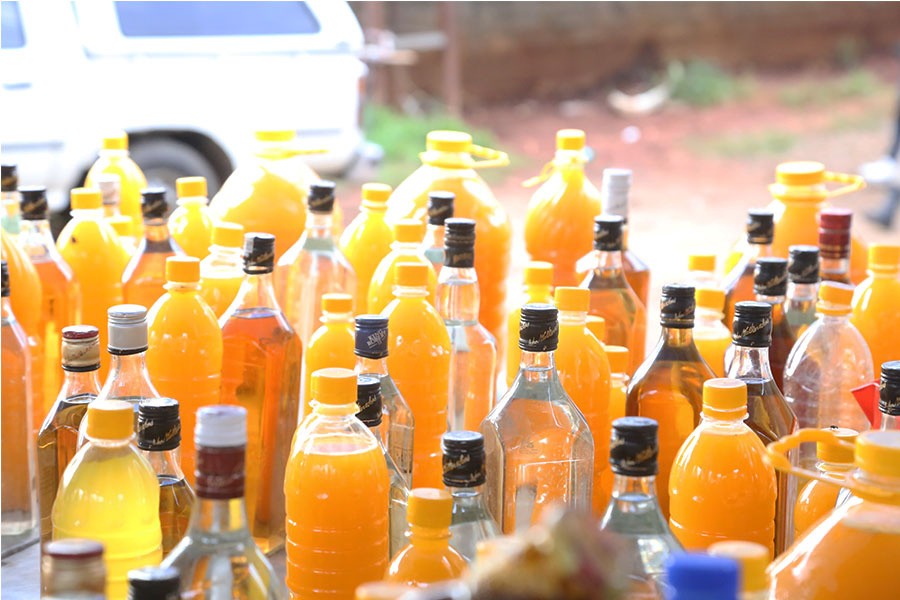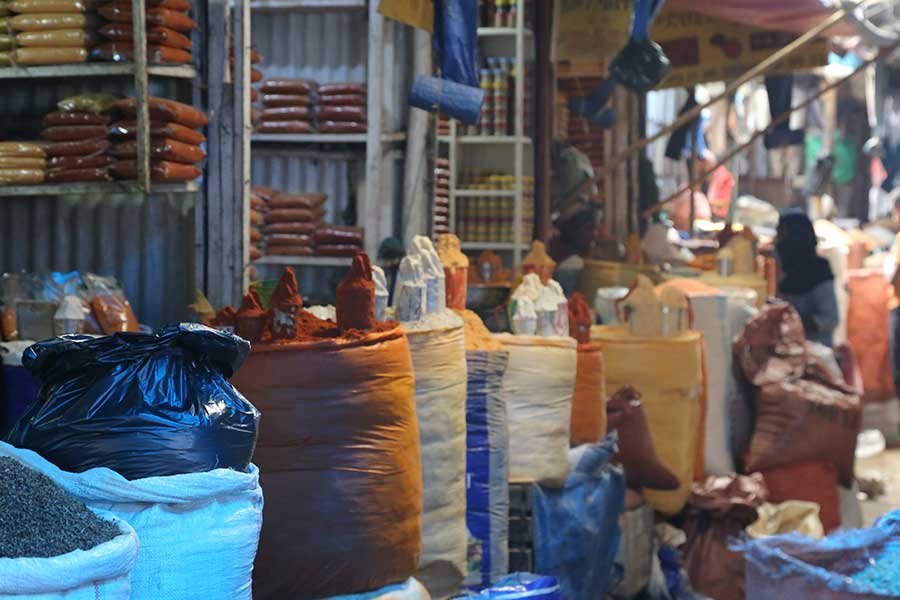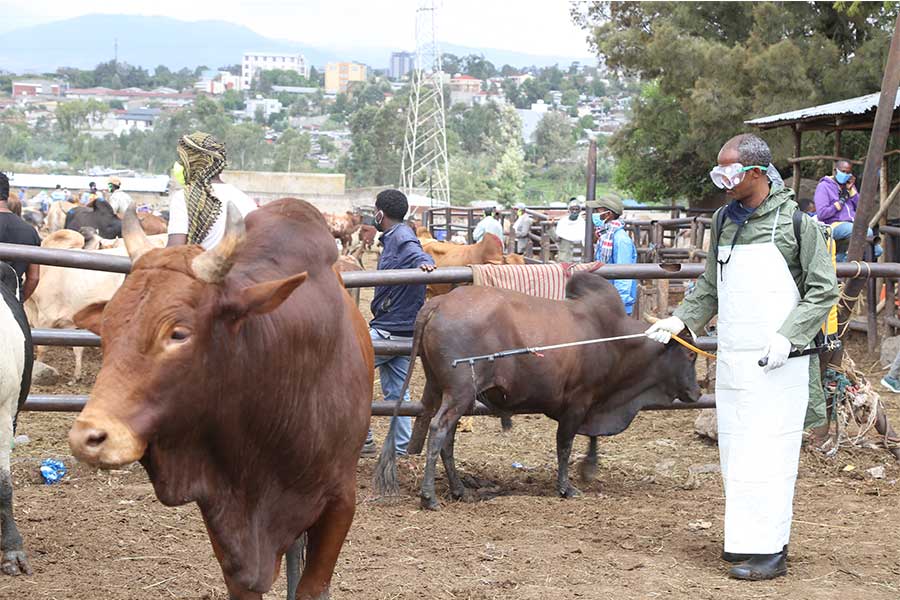
Life Matters | Apr 13,2024
Despite the bluster and an enticing outside appearance, the Addis Abeba Exhibition Centre near Mesqel Square stood rather empty last Wednesday evening. It was an unusual scene for the season. The centre is a prime venue for holiday spectacles.
So was the annual Easter Exhibition & Bazaar, which opened two weeks ago, thought to be no different. Vendors were meant to be hyper-busy during late afternoons and evening peak hours. Over 200 vendors were lined up in the Centre's four pavilions, ready to jump at the chance to sell their goods and services to visitors.
Bazaar organisers have spared no effort to lure shoppers in, including live entertainment. That evening, traditional dancers were performing on stage in colourful outfits.
Neither the bright decorations and the eager vendors nor the promises of an evening filled with music seemed to have the magic to pull the few visitors into a festive mood. The sombre atmosphere was unlike the Christmas Bazaar hosted during the "Great Ethiopian Homecoming," when the Centre was awash with those from the Diaspora. They had sojourned to Ethiopia after the administration of Abiy Ahmed (PhD) invited them to return.
This time around, shoppers were scarce. There was no semblance of excitement in the venue. Visitors continued to browse around and leave empty-handed. Empty booths dot the pavilions.
Still, the booths were stocked with everything from clothing, furniture and shoes to bedding, children's toys, kitchenware and food items. Vendors hope the activities will pick up in the days leading up to Easter celebrations next week. The signs are ominous.
"There's no business," said Eyerusalem Teshome, a vendor offering children's goods at her stall. "People can't afford to buy these."
Her observations reflect the skyrocketing cost of living in the capital. The topic has received much attention over the past month, following unprecedented hikes in prices for cooking oil. Prices for a five-litre bottle of sunflower oil nearly doubled, seemingly overnight, to close to 1,000 Br.
For those keeping a close eye on the reports published by the Ethiopian Statistics Service, the development may not be as surprising. Headline inflation clocked in at 33.6pc in February, above the 30pc mark for the seventh month. Food items saw a 41.9pc rise in the consumer price index compared to the preceding February, as grains including teff, wheat and maize exhibited significant price jumps.
The ballooning costs cause vendors' anxiety, as fewer shoppers would have budgets sufficient to cover the cost of essential goods, let alone frills at a holiday bazaar.
Eyerusalem, 35, is a housewife who has been a regular at holiday exhibitions and bazaar events for the past 12 years. She buys the goods on offer in Merkato, the capital's largest market, hoping for a tidy profit from sales at the Bazaar. The money she makes at the bazaars helps her provide for her four children.
She paid 75,000 Br to rent her small stall, where she has kids' shoes, clothes and toys on display. A pair of shoes was on for as much as 900 Br, 50pc higher than she would have asked for a similar pair last year. Some 10 days into the event, Eyerusalem has not made enough to cover rent, let alone profit from the venture.
Crowds were a little sparse at the Easter Bazaar organised by Mela Events, an industry newcomer, last week. Over 200 businesses have rented space at at the venue in Mechare Meda, in the Sarbet area.
She had also rented out a stall at last year's Easter Bazaar, organised at Mechare Meda (in the Sar'bet area) by Eyoha Entertainment & Events, an industry veteran incorporated in 2015 with 50,000 Br capital. Though she paid 130,000 Br for space last time around, Eyerusalem says it was profitable. She fears it will not be so this year.
"The burden of the cost of living can be seen on people's faces," Eyerusalem observed. "They like the items but tend to leave as they hardly afford them."
Organised by the Exhibition Centre & Market Development Enterprise, a public enterprise under the Addis Abeba City Administration, the Easter Bazaar opened on April 2. It marks the second time the Enterprise is organising a holiday exhibition on its own this year. It was compelled to host the Christmas Bazaar after Betahon Special Events Plc, a newcomer to the event industry, failed to host after offering a record-high 68 million Br, 19 million Br higher than Eyoha Addis Entertainment paid to host the same event two years ago.
Betahon had also won the bid to host the Easter Bazaar after offering 43 million Br.
However, the company failed to meet the terms of its contracts, which the Enterprise eventually terminated.
Despite the languid scenes last week, the Enterprise hopes the event will draw in as many as one million visitors before it closes on April 23, on the eve of Easter under the calendar Ethiopia uses.
"Many people are attending," said Tesfaye Abate, director of corporate communications. "We're hopeful the flow will meet our expectations."
The Enterprise has attempted to soothe the worries of vendors, offering discounts of more than 20pc on rental fees. A nine square metre stall that would have been rented out for 90,000 Br is going for around 70,000 Br.
However, visitors' entrance fees climbed to 40 Br, 10 Br more than what shoppers paid to peruse the Christmas event.
"It's common for the sales to slow down in the early weeks of such an event," said Tesfaye. "The flow will increase dramatically on weekends."
Nikodimos Tantu, a vendor, hopes this will hold over this weekend. He sells women's clothing, mostly tights and sweatpants, in a booth he rented for 95,000 Br. He had paid 50,000 Br to rent a similar-sized stall at last year's Easter Exhibition in Mechare Meda. Nikodimos was at nearly all holiday exhibitions hosted over the past four years. He buys the items on sale at his booth from Everest Textile Ethiopia Factory through bidding.
A lack of buyers frustrated Nikodimos.
"Sales were better at the event held at Mechare Meda before the Ramadan fasting season began," he said.
Nonetheless, some visitors see the bazaar as relief from ordinary markets. Buyers like Tigist Assefa, 30, a mother of one and a journalist, prefer to buy food items at the Exhibition Centre in hopes of receiving a discount. After a few hours of browsing, she had bought some pasta and a food processor.
"Prices were as we expected," said Tigist. "We found a good discount."
Kal Teklu, a hired salesperson, runs the stall where Tigist bought her pasta. He offered five Birr lower than the 55 Br a kilo charged at ordinary kiosks. However, even his discounted rates remain out of reach for most consumers in Addis Abeba.
Policymakers have struggled to tame the blazing inflation rate, but little has transpired from the efforts.
The Addis Abeba City Administration introduced Sunday markets where farmers or producers directly offer their products to consumers earlier this year. The initiative has been met with relative success, leading city officials to announce plans to scale it up.
Shoppers can visit another bazaar at Mechare Meda, an open-field venue that has increasingly been attracting events since the onset of the COVID-19 pandemic. It, however, did not host a Christmas exhibition a few months ago due to a nationwide state of emergency.
Mela Events, a company incorporated earlier this year, is hosting the Easter bazaar. It is the first company to organise a bazaar at Mechare Meda since Jorka Events, a prominent organiser, set up a Christmas exhibition at the venue in December 2020. Over 200 businesses have rented space at Mechare Meda; a nine square metre tent rented out for between 30,000 and 35,000 Br, much lower than vendors pay at the Exhibition Centre.
Sponsored by St. George Brewery, the bazaar was opened a week ago and remains open this week.
Scenes there, too, are subdued.
Several vendors at Mechare could be seen sitting idle or roaming around the grounds for lack of customers. Though more visitors began to pour in in the evening, few paid attention to the playground nearby nor the swimming pool and riding arena, where camels and horses were strolling around with no one on their saddles.
Although items on offer at Mechare are reasonably similar to those on display at the Exhibition Centre, vendors at Mela's bazaar offer essential food items, including cooking oil. Among them is Alkebir Plc.
The company imports and distributes food products like palm and sunflower oils, sugar, flour, and rice from Turkey. It was present in similar exhibitions over the past two years, offering the commodities for consumers at retailers' prices. A five-litre bottle of sunflower oil goes for 910 Br, while a kilo of sugar is sold for 50 Br. Slightly more affordable than in markets and kiosks elsewhere in the capital, the oil is rationed out to no more than two bottles a buyer.
Alkebir spent almost 70,000 Br on renting two tents at Mechare. Its booth seems to be garnering more shoppers' attention than nearby vendors.
"Sales are going well," said Rawda Imam, a partner at the company.
Others, like Shega Teff, say business is not so bad. Earlier this month, the company opened for business with its shop around the Goro area selling high quality "Magna" teff flour. Shega's representatives say they are participating in the bazaar to promote their company.
"Sales are good so far," said Fantahun Mulu, a salesperson.
The vendor offers a kilo of the staple grain for between 760 and 790 Br. Fantahun says they sell up to 30Kg a day.
Still, visitors at Mechare seem a little more upbeat than those at the Exhibition Centre. Dagmawit Fikresilassie was making the most of her visit, slowly browsing with keen interest through the items on offer. She bought a pair of sweatpants for 550 Br and looked for anything else that might catch her eye.
"I usually attend bazaars unplanned," she said.
Perhaps unsurprisingly, visitors who showed up to enjoy a few drinks and the musical performances at both events outnumbered those who were there to shop. Beer, as always, was ubiquitous. A cup of draught was on sale for 25 Br.
Nonetheless, organisers, vendors and visitors alike will have noticed the relatively subdued atmosphere at this year's Easter exhibitions held at both venues. The hosts and tradespeople hope for a windfall in the coming week.
PUBLISHED ON
Apr 16,2022 [ VOL
23 , NO
1146]

Life Matters | Apr 13,2024

Radar | Jul 17,2022

Featured | May 04,2019

Radar | Apr 13,2019

Fortune News | May 09,2020

Fortune News | Sep 06,2020

Viewpoints | Jun 25,2022


Commentaries | Jun 15,2024

Fortune News | Apr 17,2020

Dec 22 , 2024 . By TIZITA SHEWAFERAW
Charged with transforming colossal state-owned enterprises into modern and competitiv...

Aug 18 , 2024 . By AKSAH ITALO
Although predictable Yonas Zerihun's job in the ride-hailing service is not immune to...

Jul 28 , 2024 . By TIZITA SHEWAFERAW
Unhabitual, perhaps too many, Samuel Gebreyohannes, 38, used to occasionally enjoy a couple of beers at breakfast. However, he recently swit...

Jul 13 , 2024 . By AKSAH ITALO
Investors who rely on tractors, trucks, and field vehicles for commuting, transporting commodities, and f...

Oct 18 , 2025
The political establishment, notably the ruling party and its top brass, has become p...

Oct 11 , 2025
Ladislas Farago, a roving Associated Press (AP) correspondent, arrived in Ethiopia in...

Oct 4 , 2025
Eyob Tekalegn (PhD) had been in the Governor's chair for only weeks when, on Septembe...

Sep 27 , 2025
Four years into an experiment with “shock therapy” in education, the national moo...